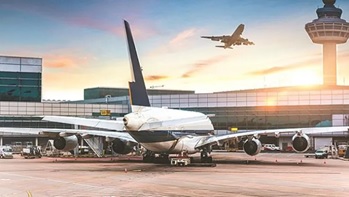The addition of new flights at airports will now be based on passenger-handling capacity at security checkpoints, according to the Bureau of Civil Aviation Security (BCAS).
The civil aviation security regulator issued directions in this regard on May 22 in a move to reduce congestion and delays inside airport terminals. Following this, airports will have to check passenger-handling capacity at security checkpoints before allotting slots.
The BCAS directive will not immediately impact ongoing flight schedules but has upset airports, which fear cost escalation. The Association of Private Airport Operators (APAO) has objected to the order, saying the parameters considered by the regulator are too conservative.
The airports believe that massive capital expenditure will be needed for capacity augmentation if the directives are implemented. APAO has also urged the Ministry of Civil Aviation to appoint an international consultant to undertake such a capacity assessment exercise.
The BCAS move comes against the backdrop of chaos at Delhi Airport last winter, with passengers complaining of long waiting times at the entrance and security checks. Following this, the ministry took several steps to decongest terminals in Delhi. Aviation Minister Jyotiraditya Scindia also chaired meetings to assess the readiness of airports for peak travel seasons.
CAS has fixed the maximum per-hour passenger processing capacity (to be updated twice each year) of airports based on baggage X-ray machines and screening facilities for staff and crew, among other things. This, in turn, has been determined by the per-hour processing capacity at each baggage X-ray machine.
On the domestic side, the processing capacity per machine per hour has been kept between 135 and 180 passengers; the higher throughput is for machines with automated tray retrieval systems.
On the international side, the processing capacity per machine per hour is between 105 and 160 passengers. International passengers typically carry more bags than domestic ones, and hence the processing capacity of machines on the international side has been determined to be lower. Also, during winters, the processing capacity is likely to decrease as passengers need more trays for their jackets, winter wear, etc. Thus, airport operators have been advised to plan proportionate infrastructure in terms of space and equipment to meet additional requirements during the winter season.








